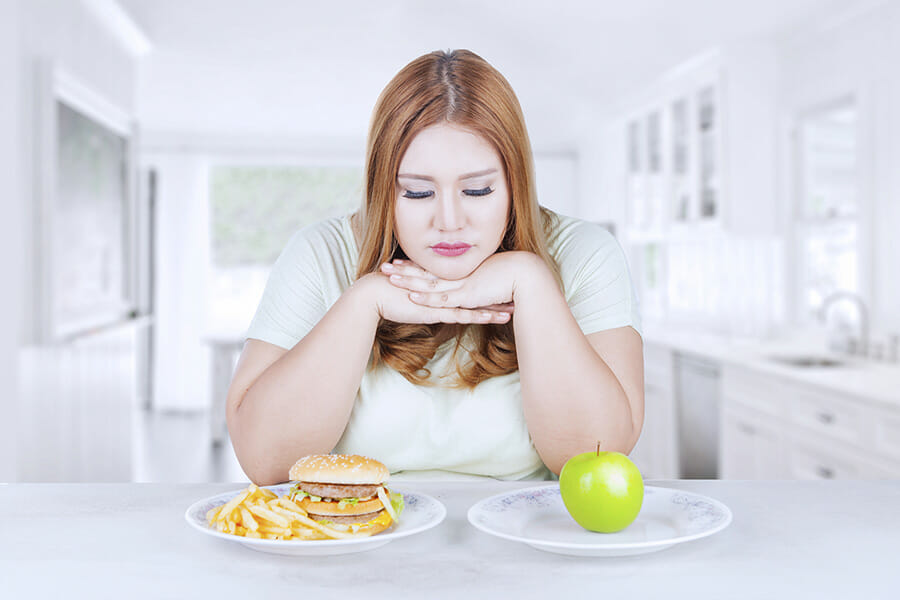
It’s the end of the day, you’re exhausted and the family is hungry. You’ve cooked a somewhat healthy dinner amongst the chaos and made sure plates are filled around the table. The kids are playing up and by the time you’re finally ready to eat, a cold plate is not that satisfying. So instead you put it aside and tuck into some ice cream.
Chances are this scenario is a variation of reality for many busy mums. Food is more often than not involved in many of the strongest emotional moments in life. But when does this connection between food and emotions become problematic?
What is emotional eating?
Put simply emotional eating occurs when things get tough or challenging, when you’re having a bad day at work, feeling sad and exhausted.
According to the Harvard Health Letter, reaching for those high-fat and sugary snacks when we feel vulnerable can be a vicious and addictive cycle, which rewards parts of the brain that ensure the behaviour is likely to be repeated. Continuing this cycle leads to physical issues such as obesity. There are also psychological issues that are harder to spot and which exercise and change in diet may not be able to fix.
It’s important to understand WHY you reach for food in certain situations and how to break the cycle with healthier methods of coping.

6 strategies to help you deal with emotional eating
1. Know your triggers
A good way to identify this is to keep a food diary of what you eat along with tracking your behaviour and feelings in the moments before you ate. This will make clear the difference between emotional eating and hunger. Are you bored? Is your job highly stressful? When you realise what drives you to the fridge you have the chance to change the way you react to these situations.
2. Distract yourself
So you’ve identified your triggers now what? It takes roughly five minutes to distract your brain from craving that high-fat high sugar hit. Put on some music and dance, call a friend or go for a walk down the road. The best distractions are those that take you far away from where the food is kept.
3. Stress relief
Let’s face it, stress is inevitable in our modern day lives which means we may turn to stress eating. But in reality, getting rid of the cause of the stress might not be feasible. Instead, why not try yoga or mindful meditation? If that’s not your thing another option may be to engage in another form of group activity such as taking a body pump class at your local gym or joining a book club at your local community centre. Engaging in a group activity which gives you the opportunity to unwind. If all else fails to strike your interest, make sure you get enough sleep. Fatigue makes you more likely to emotionally eat.
Read our experts 5 tips for getting better sleep.

4. Exercise!
Those people you hear that are addicted to exercising are not an urban myth. In fact, exercise works the same way as emotional eating does! When we work out, proteins are released in the brain that not only make us feel good, it makes us happy. Unlike emotional eating, these euphoric feelings last longer and give us more energy. Research shows a 20-minute walk can dramatically affect the release of chemicals in the brain so start small and increase your heart rate as your fitness gets better.
Try some of our quick workout videos from the 28 Day Weight Loss Challenge to get you started (you can even do them from your own home!).
5. Boredom
This is a big reason why people emotionally eat. In our highly stimulated, visual and fast-paced society, when we are faced with a break, some of us do not know how to handle it. Why not try setting up a bucket list of things you’ve always wanted to do? Or if the opportunity presents itself reconnect with your partner, friend, sibling or parent. When we involve ourselves with familial human interaction, our brain releases love hormones such as oxytocin, which doesn’t compare to a tub of ice cream anyway!
6. Seek Professional Help
Sometimes we can’t stop emotional eating on our own. It can be deeply rooted as a learned behaviour during childhood where, for example, you were rewarded consistently with treats for being good. You may need to get help from a therapist with Cognitive Behavioural Therapy (CBT). CBT helps discover destructive thought patterns that negatively impact behaviour such as eating to feel better about a bad situation. Under the guidance of a therapist, CBT encourages you to break this cycle and implement more productive coping strategies.
If you are looking for professional help for your emotional eating or eating disorder please contact Eating Disorders Victoria on 1300 550 236 or The Butterfly Foundation’s national helpline on 1800 33 4673.
Emotional eating is not a matter of willpower. If you pay attention to your triggers and commit to your strategies, your physical and mental health will turn out better for it!
Join our community of supportive mums!
If you are wanting to get that bit of extra support in your journey to better health come and join our community of over 1.5 million mums.

With hundreds of thousands of mums from all over Australia, all with the same goals, concerns, and struggles, our community is there to support you through it all.

